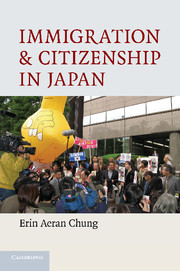Book contents
- Frontmatter
- Contents
- Tables and Figures
- Conventions and Abbreviations
- Acknowledgments
- Immigration and Citizenship in Japan
- Introduction: The Contradictions of Japan's Immigration and Citizenship Politics
- 1 Is Japan an Outlier? Cross-National Patterns of Immigrant Incorporation and Noncitizen Political Engagement
- 2 Constructing Citizenship and Noncitizenship in Postwar Japan
- 3 Negotiating Korean Identity in Japan
- 4 Citizenship as Political Strategy
- 5 Destination Japan: Global Shifts, Local Transformations
- Conclusion
- References
- Index
4 - Citizenship as Political Strategy
Published online by Cambridge University Press: 03 May 2010
- Frontmatter
- Contents
- Tables and Figures
- Conventions and Abbreviations
- Acknowledgments
- Immigration and Citizenship in Japan
- Introduction: The Contradictions of Japan's Immigration and Citizenship Politics
- 1 Is Japan an Outlier? Cross-National Patterns of Immigrant Incorporation and Noncitizen Political Engagement
- 2 Constructing Citizenship and Noncitizenship in Postwar Japan
- 3 Negotiating Korean Identity in Japan
- 4 Citizenship as Political Strategy
- 5 Destination Japan: Global Shifts, Local Transformations
- Conclusion
- References
- Index
Summary
In July 2000, the New Komeito Party, a member of the ruling coalition, drafted a bill to grant foreign residents the right to vote in local elections. Although the local voting rights bill gained support from the ruling coalition and opposition parties, conservative members of the Liberal Democratic Party (LDP) argued that the bill was unconstitutional and that granting voting rights to foreign residents would reduce the already low naturalization rates among Korean residents. Such a move, they claimed, would provide further incentive for Koreans to maintain their “privileged status” without declaring allegiance to Japan. As a countermeasure, the LDP drafted legislation in 2001 aimed at easing naturalization requirements for special permanent residents. The proposed legislation would allow special permanent residents to acquire Japanese citizenship by declaration alone and would involve a simple registration process. Proponents of the bill argue that Koreans in Japan have already assimilated into Japanese society and that easing naturalization procedures would give them greater freedom to choose their nationalities.
Both bills, which as of this publication have remained under debate in the Diet since their introduction, appear to benefit the Korean-resident community in Japan; nevertheless, Korean reactions have been mixed. Most Korean activists support the voting rights bill, for which a wide section of the Korean community has lobbied since the mid-1980s. In contrast, Korean activists have been among the most vocal opponents of the naturalization bill.
- Type
- Chapter
- Information
- Immigration and Citizenship in Japan , pp. 115 - 143Publisher: Cambridge University PressPrint publication year: 2010



